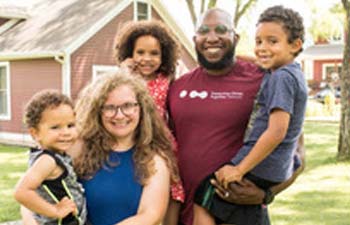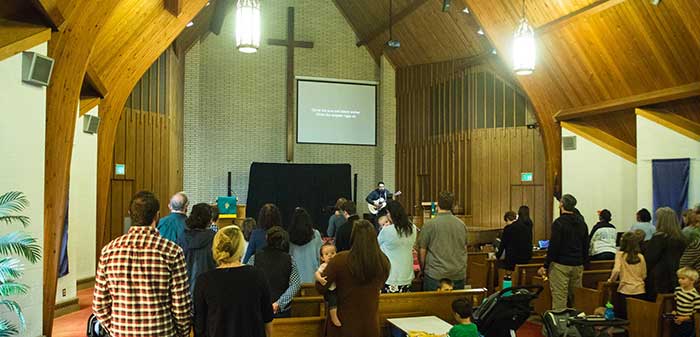10 years of prayer.
A decade of requests on their knees. Seeking God in their home. Sometimes short, sometimes passionate, sometimes patient.
Ten years of prayer for a church that embraced and empowered serving.
There are churches in or near West St. Paul, Minnesota, where Ben and Deanna Gengler live. The region has a long, deep history of faith, especially in Lutheran and Catholic churches.
But, in West St. Paul, many people commute out of the town of 20,000 to worship. In addition, the public transportation systems around the city operate independently. So, bus routes don’t easily connect to blessings, Ben Gengler said.
“If I want to reach the least of these, they’re not going to really have the independent access to the church I go to,” Gengler explained.
God has answered those prayers: Restoration Hope Church started September 12 in West St. Paul.
The Genglers met Josh and Lindsay Williams early in their church planting process. The Genglers heard about the Williams’ desire to start a church from a friend.

“We were primed to begin with,” Gengler said.
In fact, they were on board before the Williams even started forming the core team. He said they watched and waited while Josh Williams went through the process, including a ministry fellowship at another church.
What are several more months of waiting when you’ve been praying for a decade?
Loving a place that’s been annexed and avoided
One reason the wait got easier is the heart the Williams have for their new city. Josh Williams grew up in East Orlando, but college and marriage brought him into West St. Paul, a place where he’s thrilled to live.
“Nobody moves into West St. Paul because they actually care about West St. Paul,” he said.
Helping middle school students with homework fuels Williams’ passion for the city. In those moments, he sees students who are Hispanic, Black and from a mix of backgrounds and life experiences.
Also in West St. Paul, people earning high incomes – usually Anglo – enjoy Panera’s organic apples and artisanal cheeses. In addition, there’s a Target and a Wal-Mart, each attracting a particular demographic.
“West St. Paul is a place where two worlds clash,” he said. “We want to uphold the gospel above anything and show it unites people across barriers.”
That desire is already becoming a reality in the church. For example, Williams is a Black pastor serving a mostly white congregation. Moreover, white and blue-collar workers, pro-vaxxers and anti-vaxxers, single women on Christ’s mission and people who’ve served prison sentences all worship together.
“I love that because it shows we can come together around the gospel,” he said. “We already are reflecting the community.”
Related: New Colorado church reaches beyond the walls
The city’s history includes struggling chapters where nearby municipalities annexed or assumed responsibility for sections of the Mississippi River town. These boundary changes muddled West St. Paul’s distinct identity.
Meanwhile, Williams never wanted to start a church unless he had a heart for that city.
“We want to be part of the city. We want to serve the city,” he said.
Small groups are where the gospel’s at
Williams’ motivation draws the Genglers to the culture the core team is creating at Restoration Hope.
The church’s name draws from a hopeful, theological framework about life: creation, fall, redemption and restoration. Everything began with God’s creation. Then, the fall happened but Christ initiated redemption and will someday restore all that God made.
Confidence in Christ’s restorative power inspires the gospel community groups of Restoration Hope. These small groups are the center of mission within the new Converge church.
Related: Three signs of effective small group gatherings (video)
“If you want your neighbors to hear the gospel, don’t bring them here,” Williams said. “I would rather them hear about Christ, be discipled in your gospel community group and then come [to a Sunday service.]”
Making room for the Vikings
Restoration Hope’s pre-launch planning settled on three unique elements, two related to the Sunday worship service and one essential to the gospel community groups.
First, the Sunday worship services that started in September begin at 4 p.m. That’s a missional decision respecting the first love of many in Minneapolis: the Minnesota Vikings National Football League team.
“We have our church at 4 p.m. to be timed around football games because there’s a big football culture,” Williams explained.
Second, every Sunday worship gathering includes about 10 minutes during the service to focus on relationships.

“We do three songs, then announcements, then 10 minutes for people to connect,” he said. “This 10 minutes is worshiping God together with other people in community. We want to break up the fact that this is not just the service. This is really you gathering together with God and his people.”
Related: A story of the Lord’s mysterious and never-ending blessings
In the gospel community groups, a central practice is giving each group autonomy to be on mission as they feel led. In other words, Williams encourages mission without pressuring or directing the particular activity.
“The gospel community groups get to reach out however they see it needing to be done,” Gengler said.
For example, he said his gospel community group tried sharing hot dogs in a nearby town park to connect with neighbors. Success or failure was less of a measurement, in Gengler’s experience, than working the process to be reaching out.
“You don’t have to have it all figured out,” he said. “You just have to be willing to be discipled.”
How did willingness become a value at Restoration Hope?
As a teenager in, Williams played basketball at his private Christian high school in Orlando, Florida. Some had mentioned NBA potential around him and he was hoping to end up at an NCAA Division I school.
He wasn’t a Christian but was praying God would get him into a good basketball school. He didn’t play in AAU leagues or have the same support other skilled basketball players have.
Then, he was invited to a youth group where a leader described how patient Jesus was with Peter. That night, a youth leader told the teens about Peter’s betrayal of Christ. After that, Williams heard how Jesus and Peter soon had a short talk full of grace and truth.
“He was talking about Peter and how patient Jesus is,” Williams remembered. “I thought ‘You can do that with me.’”
Related: “Would you bow to Jesus?”
Williams didn’t experience a lot of patience from students, coaches and family. But the grace Jesus showed to Peter made it past Williams’ unbelief and broken relationships.
“Jesus is real,” he realized that night. “I didn’t think ‘That was 2000 years ago.’ It’s almost as if I’m being drawn.”
There was no altar call at youth group that night. Instead, Williams’ heart was the altar upon which he inwardly responded.
“Jesus, I want to know you. Would you help me to know you?” he asked.
He went home, knowing he was different. For one thing, the young man who often argued like a defense attorney with his mother stopped.
Discipleship has a beginning but never ends
Even so, he began spiritually searching, a pattern that continues to this day. He started reading Scripture, talking to teachers and growing in grace. He wanted to make sense of what had happened. Moments of gospel clarity surprised Williams time after time.
“All of the Scriptures are really pointing toward Jesus,” he said.
Gospel clarity came when he preached. He realized people need a shepherd for their lives, not just a speaker on Sunday mornings.
Another insight came when he performed a wedding ceremony for his friend. Only eight months later, the new wife died in a car accident. Now, Williams and his friend grieved and sought to understand God’s character as revealed in the Scriptures.
Related: Creating a culture of evangelism: discipleship
“Discipleship is a lifelong process,” he said, “of (learning) who Jesus is and what he’s done in my life and how that changes me.”
That’s why, with the people of West St. Paul, Williams honors their journey. He is still searching out the riches of the gospel. So, he grasps the time and effort it takes to grow into the likeness of Christ.
The answered prayers keep coming
Allie Anderson and her husband, Jeremiah, quickly appreciated Restoration Hope’s culture. They’re native Minnesotans who had also been praying for a church for their family.
“It was such an answer to our prayers to meet with Josh and see his enthusiasm and his heart for the area,” she said. “From the very beginning, we were really excited about it.”
Their early enthusiasm continues with gratitude for God’s faithfulness.
Just the other day, the Andersons recognized the church is like family. They didn’t know most of the people until the church started. Yet, their seven-year-old daughter said Sunday’s her favorite day. She has a sense of extended family with the Christians.
The church’s culture offers more than just a generally welcoming environment, she said. Minnesota has a friendly culture; in fact, ‘Minnesota Nice’ is a casual, cultural term about the community’s agreeable demeanor.
At Restoration Hope Church, the Lord formed a community of people who didn’t know each other but now connect in a place of love.
“It’s different from a lot of the communities we find ourselves in nowadays,” she said.
Restoration Hope Church is one of 312 churches Converge’s 10 districts committed to plant before 2026. Read more inspiring church planting stories and learn more about the goal to plant 312 churches in five years.